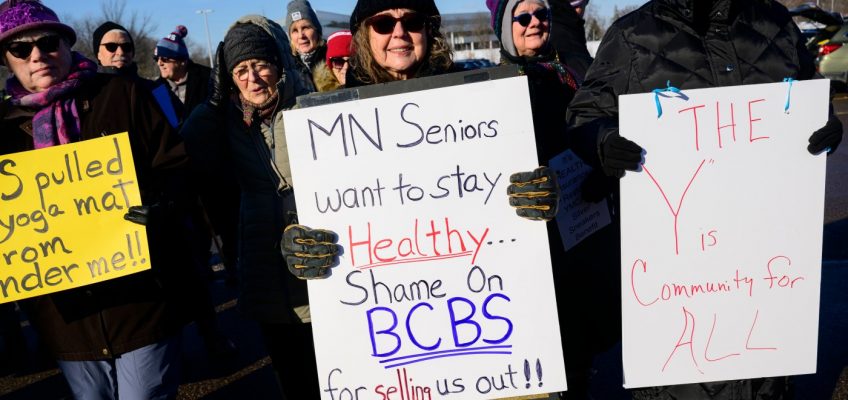Alarmed at the prospect of losing their “Silver Sneakers” senior gym memberships at YMCAs and Life Time Fitness locations across the Twin Cities, more than 50 protestors took their concerns to the corporate headquarters of Blue Cross Blue Shield of Minnesota in Eagan to demand full reinstatement of their Medicare Advantage fitness benefits.
They were met with a receptive audience, said Terre Thomas, who co-organized the chilly Wednesday afternoon protest with Steve Brandt, a former Star Tribune reporter and elected member of the Minneapolis Board of Estimate and Taxation. The two were invited by Blue Cross to relocate the 30-minute picket — which featured a brief but coordinated step-tap dance number — from a grassy easement. The protest was held instead in the more expansive Blue Cross parking lot off Yankee Road.
Thomas and Brandt had met the day before with Dr. Mark Steffen, chief medical officer for Blue Cross Blue Shield of Minnesota, alongside the insurer’s marketing, sales and Medicare Advantage staff. Thomas said the group walked them through a timeline of events that helped shape their understanding of the situation.
“There were a lot of people at the rally that said this is all about corporate greed,” Thomas said. “I don’t think that’s true. It’s math. … What they said is we want to listen to you and let us explain the numbers to you.”
Gym benefit
Through a two-year contract with third-party benefits administrator Tivity, which is based in Tennessee, Blue Cross Blue Shield of Minnesota this year had offered “Silver Sneakers” gym memberships to all 425,000 of its Medicare Advantage members. Of that number, up to 26,000 members had signed up for free gym memberships at Lifetime Fitness and YMCA of the North locations throughout the Twin Cities through what Tivity defined as its “premier level” of service.
Only about 11,000 seniors were active participants at those sites, Thomas said she was told, but the contract was priced “per head,” as the benefit had to be made available under the law to all members.
By June, Thomas said, Blue Cross Blue Shield had largely determined what benefits it would offer next year, only to later learn that UCare, the state’s nonprofit health plan, would terminate all of its Medicare Advantage contracts by 2026. While many UCare members will shift to Medica, some 100,000 to 150,000 UCare members have found their way to Blue Cross Blue Shield, unexpectedly increasing the Eagan-based insurer’s total number of Medicare Advantage members well above 500,000.
The cost of covering Tivity’s premier level of service had already increased considerably, before new members were added, Blue Cross Blue Shield officials told Thomas.
Potential work-arounds
Thomas said she presented with Blue Cross Blue Shield with some potential work-arounds aimed at subsidizing or otherwise negotiating affordable memberships at the YMCA and Life Time Fitness. Officials with the insurance provider said the earliest any of those could be implemented would be 2027.
The YMCA has offered “Silver Sneakers” members impacted by the UCare and Blue Cross Blue Shield situation discounted rates of $49 per person, down from $77, and $79 per couple, down from $110.
Blue Cross Blue Shield Medicare Advantage members may still access more than 200 alternate gym sites throughout the Twin Cities, as well as Life Time and YMCA sites outside the metro, though many boutique gyms and nursing home-based facilities offer limited hours, do not have swimming pools and host just a handful of senior classes per week.
Related Articles
Shredded cheese sold in dozens of states recalled due to potential for metal fragment contamination
What to know about the hepatitis B shot — and why Trump officials are targeting it
A hidden health crisis following natural disasters: Mold growth in homes
Delayed care to 2 Black pregnant women highlights maternal health disparities
Medical leave applications opening for Minnesotans who welcomed a child in 2025
“The evidence of the health benefits of exercise cannot be overstated,” said Dr. A. Mark Fendrick, a professor of internal medicine at the University of Michigan whose research specializes in the healthcare insurance marketplace.
“Every study of cognitive health to to cardiovascular health to cancer survivorship to mental health shows regular exercise improves outcomes,” Fendrick said. “More is always better.”




